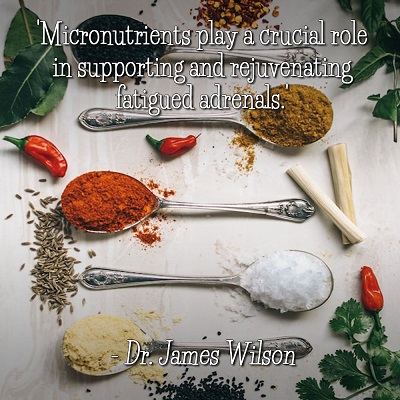 Vitamins and minerals play a vital role in supporting adrenal health and recovery, as they are involved in aiding the various processes related to hormone production, energy metabolism, and stress response.
Vitamins and minerals play a vital role in supporting adrenal health and recovery, as they are involved in aiding the various processes related to hormone production, energy metabolism, and stress response.
Vitamin C, for instance, is known to help the adrenal glands produce cortisol, a hormone that aids in managing stress.
B vitamins, including B5 (pantothenic acid) and B6, are integral for adrenal function as they contribute to the production of adrenal hormones and neurotransmitters that regulate mood and stress. Additionally, B vitamins help convert food into energy, assisting in combating fatigue.
Magnesium is a mineral that is also vital for adrenal health as it supports relaxation, sleep, and the body’s response to stress. Adequate intake of these vitamins and minerals, often found in whole foods, such as fruits, vegetables, whole grains, and lean proteins, can aid in maintaining balanced adrenal function and promoting recovery from periods of stress.
Choosing the right vitamins to nurture and fortify these vital glands is a fundamental step toward achieving optimal health. By understanding the specific vitamins that contribute to adrenal function, you can make an informed decision as to what ones suit you.
Here are some of the vitamins and minerals that are often associated with adrenal health in more detail than what we described above. However, it’s important to approach vitamin supplementation thoughtfully and consult a healthcare professional before supplementing.
Healthy Fats
One of the most important macronutrients to help in the recovery of strained adrenal glands are healthy fats. Foods like avocado, olive oil, eggs, and fish all do a great job of easing the adrenal glands back to health as fatty acids essentially form the backbone of hormones.
To support the adrenal glands with its primary function of producing several important hormones in the body, it needs fats – healthy fat sources. Adding fish oil and other supplements containing omega-3 can help in supporting adrenal health.
Vitamin B
This one we mentioned above, but did you know that stress uses up your body’s B vitamins and depletes it at a much faster rate? Increasing your intake of B vitamins such as thiamine (vitamin B1), pantothenic acid (vitamin B5), pyridoxine (vitamin B6), cobalamin (vitamin B12), and niacin (vitamin B3), will contribute directly to your body’s stress response.
Vitamin B3 helps regulate the sleep/wake cycle, vitamin B5 helps with restoring balance in terms of cortisol production, and vitamin B6 can bring a feeling of calmness and ease, which are helpful with your stress response and recovery.
Vitamin C
Vitamin C is well known for boosting the immune system, and it can also reinvigorate the body with energy. The adrenal glands need vitamin C to help with the secretion of the cortisol hormone.
Just as stress can use up and deplete the B vitamins in your body, a stressful lifestyle can also use up vitamin C much faster. Vitamin C supplementation has been shown to help balance high cortisol levels in stressful circumstances.
Choose vitamin C food sources, especially fresh fruits that are low in sugar, or vitamin C supplements that do not contain sugar.
Vitamin D
This is often referred to as the sunshine vitamin, as you can get your vitamin D from the sun! This vitamin is essential in managing stress, so if you don’t get enough natural sunshine, supplementation can be a good option for you.
Vitamin D is associated with lower levels of cortisol, which is why it is helpful in adrenal fatigue healing and recovery. Deficiency in vitamin D also plays a role in conditions like depression, and fatigue, which are subsequent symptoms of poor adrenal health.
Vitamin E
Free radicals are capable of damaging the cells and play a role in the formation of several chronic health conditions like heart disease, diabetes, and cancer. Vitamin E can help neutralize these damaging effects in the adrenal glands and contribute to the reduction of cortisol levels associated with high levels of stress.
Enhancing adrenal health through good nutrition involves a strategic selection of vitamins and minerals that support the adrenal glands’ vital functions.
The nutrients mentioned above are most often found in whole foods like fruits, vegetables, lean proteins, whole grains, and nuts. A balanced diet that encompasses these nutrients can help you improve your adrenal health, and help you better cope with stress.






